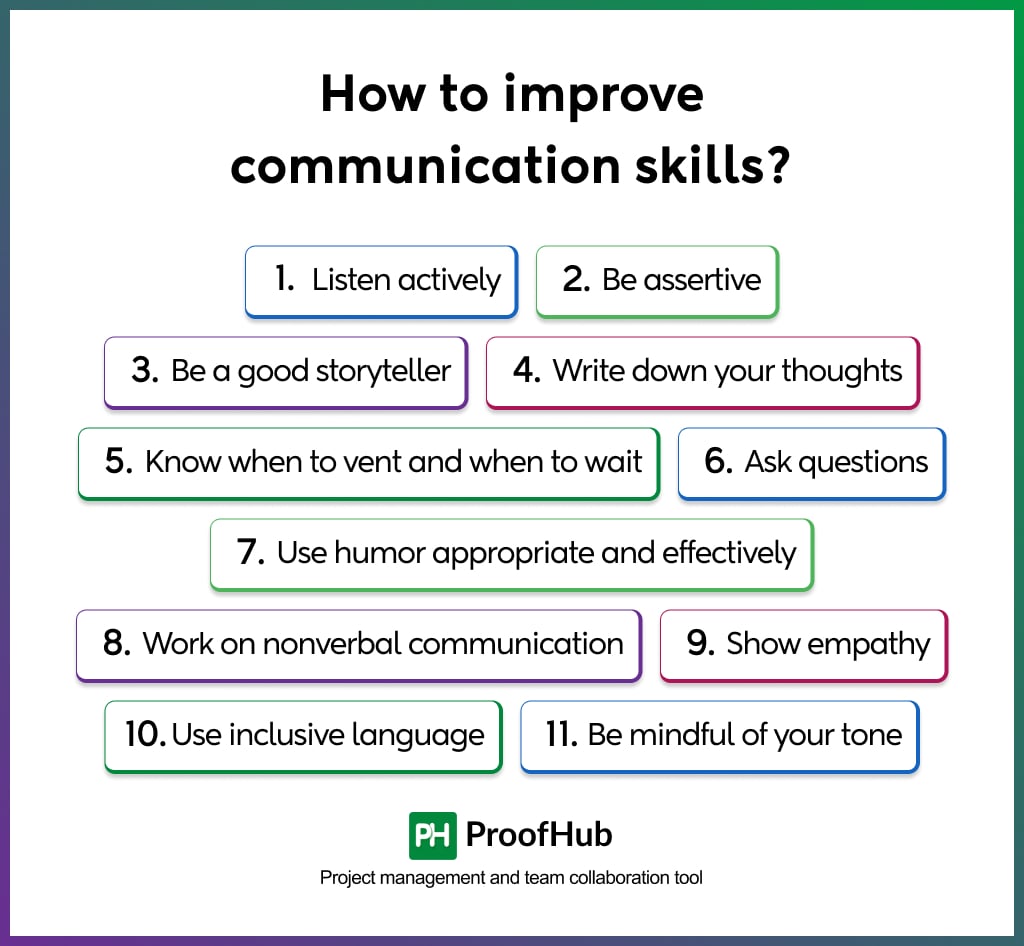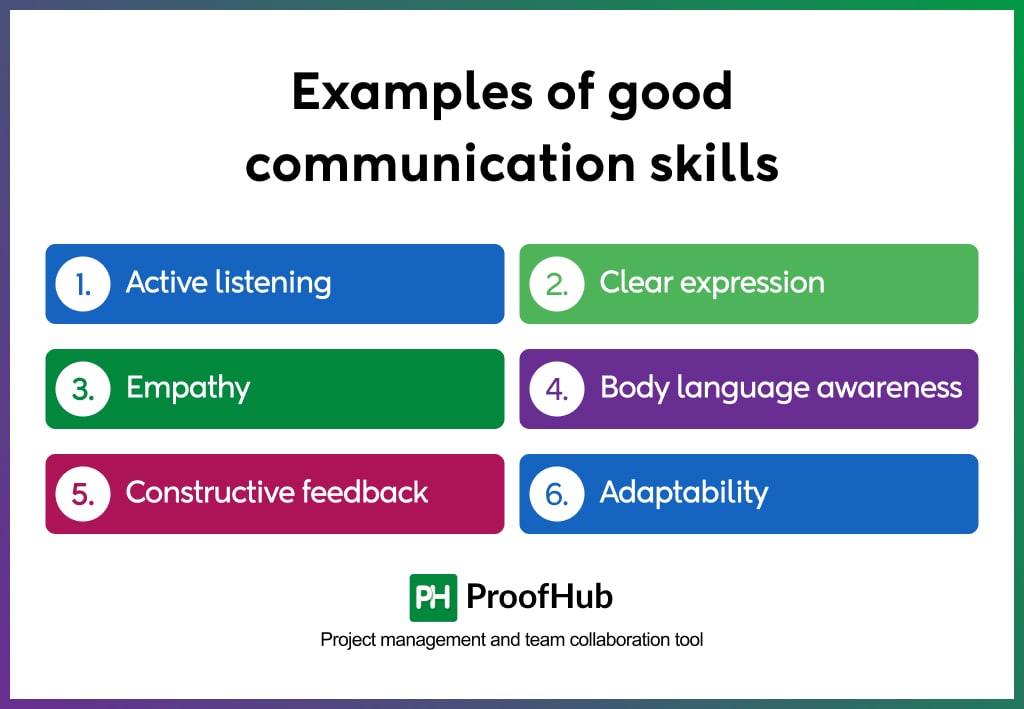Introduction
Effective communication can make or break a team in the workplace!
In fact, a study by Fierce found that 86% of employees cite poor communication as the root cause of workplace failures.
Your projects run smoothly if everyone on the team communicates clearly and openly. So, whether you’re leading a team or working within one, you need good communication skills to collaborate with your team, solve problems, and be productive.
In this article, you will explore 11 essential tips to improve good communication skills at work to build stronger connections and prevent misunderstandings. Plus, you can create a more efficient, harmonious working environment for your team.
But before that, let’s learn what communication skills are.
What are communication skills?
Communication skills are the ability to share information, ideas, and emotions with others. However, to truly connect with others, you need to express your ideas as well as understand and respond to their needs. Effective communication creates a productive and healthy work environment.
Good communication skills help people to stand out both internally and externally to the organization. It is a must-have skill that one needs whether you are working remotely or at the office.
A person with strong communication skills can foster better relationships, resolve conflicts, and succeed in personal and professional interactions.
Why are good communication skills important?
Effective communication skills are desirable workplace skills that allow us to interact with people effectively and let us make our presence felt by the people present in a discussion or a meeting.
Here are some reasons why you need good communication skills at work:
- Improves teamwork: Clear communication boosts collaboration among team members. When everyone on the team understands their roles and responsibilities, it reduces confusion and enhances team dynamics.
- Increases efficiency: Open communication minimizes misunderstandings that can cause mistakes. By clearly conveying expectations and feedback, you can complete your tasks more efficiently.
- Enhances relationships: Good communication helps you build trust and connection among colleagues. When team members feel heard and understood, it strengthens workplace relationships, creating a supportive atmosphere.
- Facilitates problem-solving: Open communication encourages brainstorming and sharing ideas, leading to innovative solutions. When members express their thoughts freely, your team can address challenges more effectively.
- Boosts employee morale: A workplace where communication is prioritized often results in higher job satisfaction. When you consider the inputs of all your team members without any bias, they feel valued, building a positive culture.
How to improve communication skills?

1. Listen actively
Effective communication isn’t about talking; it’s about listening. You can be the most interesting person in the world, but if you don’t know how to listen, you’ll never build a connection with anyone else.
By listening, I don’t mean simply waiting your turn to speak. I mean practicing active listening — paying close attention to what the other person is saying and asking questions that show you’re engaged with their story. It’s not easy to do when you’re excited about talking about yourself, but it works.
When you ask the right questions and engage the other person in conversation, they’ll remember the experience of talking with you and want to talk to you again. It can improve your communication skills and impact your career with success.
2. Be assertive
Assertiveness is the ability to clearly state your opinions, needs, and wants in a way that respects the rights of other people. Assertiveness is a skill that can be learned (with practice) and it’s worth learning — being assertive can get you what you want without damaging your relationships.
When we’re feeling frustrated by someone else’s behaviour, our first instinct might be to shout, avoid them, or even give them silent treatment. These strategies may feel satisfying at first, but they don’t solve anything — and they can make the other person feel angry or hurt in return. As a result, everyone ends up upset and nothing gets resolved.
When it comes to being assertive in business, there’s a fine line between being confident and aggressive. Confidence is when you’re willing and able to state your opinion without fear of repercussions. Aggressive communication is when you steamroll over everyone else so that your opinion can be heard.
Being assertive is about having a good balance of confidence and humility. Assertiveness is all about being comfortable with yourself and your place in the world. And it’s something that can help you get ahead in business.
3. Be a good storyteller
People remember stories — but not facts, figures, or piles of data. That’s why telling a story is one of the best ways to win over an audience and get your message across. It helps people relate to what you’re saying and see how it applies to their own lives. It will also help you to feel better.
If you want to persuade people of something, tell them a story about how someone else overcame a similar problem. If you want to inspire them, tell them a story about how you did something great. To get people excited about something, tell them a story about what it will be like when they’re finished with it.
The best way to make a case for yourself is through storytelling — not bragging, but sharing the story of your accomplishments in a way that inspires others. In a job interview, for example, you can share stories about your previous success and explain how you will apply those skills in your new role.
4. Write down your thoughts
You might think that the person who gets ahead at work is the person who knows it all or who works the hardest. But that isn’t necessarily true. The person who gets ahead is usually the one who can get along best with others.
A good way to develop your interpersonal and written communication skills is to keep a journal, in which you write down your thoughts and feelings. Not only will this help you to clarify your thoughts, but it will also enable you to put them into words.
Keeping a journal teaches you how to express yourself through writing and how to organize your thoughts logically. Writing daily for five or ten minutes will build up your skills, and soon you’ll be able to express yourself clearly with an open mind.
5. Know when to vent and when to wait
You know that whole “you’ll never get a second chance to make a first impression” thing? That’s probably the most important piece of advice you can ever receive.
But it doesn’t end with your first impression. Every word you say and every action you take can either help your career or hurt it. You get to decide which way the pendulum swings by remembering that:
No one is perfect. You are not perfect, and neither are your coworkers, boss, and clients. They will have good days and bad days. And so will you. But when things go wrong, remember to simply keep calm and carry on. Wait until the heat of your anger or frustration passes before you do or say anything that could be interpreted the wrong way (or just plain wrong).
You should vent — but only when it’s appropriate to do so. Venting has its place in the workplace, but it should be done with discretion. Save it for a trusted associate who is going through something similar, or in an open-door meeting with a manager who is receptive to hearing what’s going on at work — even if they are not directly involved in the issue at hand.
You don’t need to be an expert communicator to know that venting in the wrong way or at the wrong time is a recipe for disaster. For example, while you’re upset after someone has done something you don’t like doesn’t mean you should storm into his office and let him have it. Instead, take a step back and cool off before confronting him — especially if you’re angry and emotional.
6. Ask questions
It’s easy to make a bad impression when you’re talking to someone. You may not be aware of it, but you might be communicating in ways that come across as abrasive and condescending.
When you’re meeting with someone new, the most effective way to get things done is to ask questions.
Salespeople are trained to use questions as a selling tool: They know that asking open-ended questions plants the seed for a purchase, which makes it easier for them to close the deal. But even when you’re just trying to understand what’s going on a good question can go a long way toward making the other person feel more comfortable and less threatened.
7. Use humor appropriate and effectively
Humor is a tricky thing and can get you in trouble if you don’t use it right. However, when you do use humor appropriately, it can be the most powerful tool in your communication arsenal.
Humor breaks down barriers, reduces stress and tension, and builds rapport between people.
Humor can be a great way to get attention, keep attention, and make people like you.
The other great thing about humor is that it’s one of the few ways to show your personality at work without being cliche or unprofessional. Humor is also a rare tool that lets you emphasize a point without sounding overly aggressive or arrogant.
Use self-deprecating humor. When you poke fun at yourself, it establishes a connection with others and helps them feel comfortable around you. Don’t take yourself too seriously; if you do, your audience probably will too.
Stay positive. There’s nothing wrong with poking fun at yourself or your company as long as it doesn’t undermine trust or send negative messages about the quality of your work product. Make sure that your humor is positive — not sarcastic or condescending.
8. Work on nonverbal communication
Once you recognize that face-to-face communication is so much more than words on a page (or screen), you’ll realize that getting your message across means being in tune with many different communication channels.
“Only 7 percent of our communication is verbal,” says Kevin Kermes, director of communications for the National Institute for Healthcare Management. “The rest is nonverbal communication.”
When you are communicating with someone, be it in a meeting or on the phone, pay attention to their body language. Are they leaning forward or backward? Are they making eye contact or looking away? This can give you some insight into how well your message is being received and whether you need to make some adjustments.
Communicating with people openly, rather than with crossed arms or a scowl on your face, will help you get ahead. It’s difficult to convince someone of something if they feel you’re being closed off or untrustworthy.
You may also find yourself in a meeting with people who don’t speak English as their primary language; communicating with these people nonverbally can help you get your point across.
Also read: A guide to sharpening your nonverbal communication skills
9. Show empathy and compassion
Whether you’re trying to work with a difficult client, a passive-aggressive co-worker, or your best friend who’s going through a rough time, it helps to know how to communicate effectively with other people.
Being able to understand other people’s perspectives and approach problems from their point of view is an important part of communicating well. Empathy is the key.
Empathy — or the ability to understand and share someone else’s emotions — is really important in communication. If you can’t see things from someone else’s perspective, it’s hard to relate to them or help them solve problems.
That’s why having good interpersonal communication skills is so important. It helps us in both our relationships and our professional lives.
When we’re communicating with people, empathy makes us better at listening and understanding what the person we’re talking with is trying to say. This can make us more open-minded and willing to consider others’ opinions, even if they differ from our own.
Ultimately, having empathy leads to more positive outcomes because it shows that you care about the other person and what they have to say.
10. Use inclusive language
Don’t assume that everyone understands industry jargon or abbreviations, or even the context of what you’re saying. If you’re talking to a group, don’t assume that everyone shares common ground.
You may have heard the term “diversity” used in many contexts in business, but it’s not just about gender or race; it also applies to age, experience, education, cultural differences, and so on. It’s important to be mindful of these differences when communicating.
You can avoid alienating people by using inclusive language — language that doesn’t assume too much background knowledge and that doesn’t make assumptions based on gender or other factors. For example: “It is a fact that” instead of “Everyone knows that”; “salesperson” instead of “salesman”; “chairperson” instead of “chairman.”
Another benefit of using inclusive language is that it can help foster a more creative workplace. When people feel included in workplace communication, they feel like their opinions matter too. This means that everyone will be more likely to share their ideas and opinions without fear of judgement or discrimination.
11. Be mindful of your tone and volume
The tone and the volume of your voice play a crucial role in setting the right atmosphere for a productive conversation. The tone of your message has a major impact on the impression that it’s going to make on the audience. Generally, a calm and consistent tone of voice is preferred to connect better with your audience.
However, the tone can differ based on the situation. For instance, you need to talk calmly with a customer, whereas you have to make your tone more strict and authoritative when you are delegating important tasks to your team members.
Apart from the tone, the volume or the loudness of your voice also matters a lot. If your voice level is too dull, people will have difficulty understanding what you’re saying. On the contrary, a loud voice sounds aggressive and tends to annoy the audience.
You must balance both the tone and volume of your voice to make people more comfortable communicating with you.
Examples of good communication skills
“People will forget what you said, but they will never forget how you made them feel.” – Maya Angelou

Effective communication promotes team collaboration, boosts productivity, and creates a healthy work environment.
Here are some examples of good communication skills that can help you improve team dynamics at work:
- Active listening: Pay full attention to the speaker, resist the urge to interrupt, and ask clarifying questions. This will help you clearly understand the conversation, making others feel heard and valued.
- Clear and concise expression: Use simple and direct language to convey your message without adding unnecessary complexity. Keep it brief and focus on information-saving time while also ensuring clarity.
- Empathy: You need to understand and respect others’ perspectives to make communication more effective and build trust. Show genuine concern and adapt your message so that it also reflects their point of view.
- Body language awareness: Understand that communication isn’t just verbal. Eye contact, gestures, facial expressions, and posture, everything plays a significant role in reinforcing or undermining your message. So, you need to be mindful of all your non-verbal cues to ensure they align with your words.
- Constructive feedback: Give feedback in a helpful and respectful way. It should always inspire growth, not defensiveness. When giving feedback, balance praise with suggestions, and always aim to help others succeed.
- Adaptability: Every conversation and interaction is different. Adjust your tone, language, and approach based on the context and audience. Whether communicating with a colleague, customer, or executive, being flexible ensures your message is conveyed effectively.
Conclusion
Having good communication skills is important in any job. They can help you do your work more effectively, and they can help you work well with your coworkers.
As you go through your career and start making a name for yourself, people will pay attention to the way you speak.
If you’re poised and professional, they’ll like that. If you’re nervous or unclear, they won’t. It’s that simple.
So, as we mentioned above, working on this is essential if you want to get ahead in your career. Without good communication skills, it’s very difficult to succeed professionally—no matter what area of work you’re in.
Related articles
- What is effective communication? [with benefits and tips]
- 9 Effective communication strategies to connect better with your team
- 7 Essential tips for effective team communication
- Top 11 ways to improve internal communication in workplace
- 11 Top employee communication software to improve productivity
- 15 Amazing team communication tools for businesses

